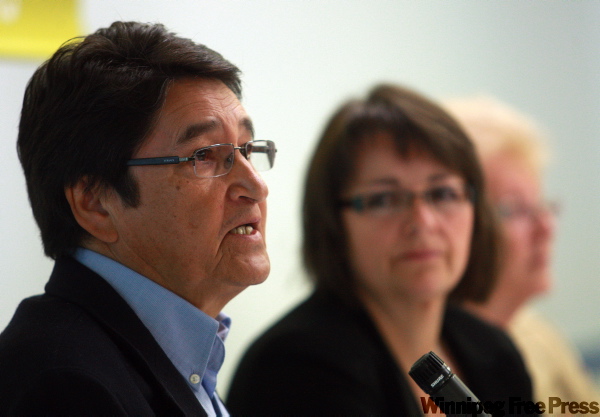Rallying cry issued to native men
Mercredi urges them to step up
Advertisement
Read this article for free:
or
Already have an account? Log in here »
To continue reading, please subscribe:
Monthly Digital Subscription
$1 per week for 24 weeks*
- Enjoy unlimited reading on winnipegfreepress.com
- Read the E-Edition, our digital replica newspaper
- Access News Break, our award-winning app
- Play interactive puzzles
*Billed as $4.00 plus GST every four weeks. After 24 weeks, price increases to the regular rate of $19.00 plus GST every four weeks. Offer available to new and qualified returning subscribers only. Cancel any time.
Monthly Digital Subscription
$4.75/week*
- Enjoy unlimited reading on winnipegfreepress.com
- Read the E-Edition, our digital replica newspaper
- Access News Break, our award-winning app
- Play interactive puzzles
*Billed as $19 plus GST every four weeks. Cancel any time.
To continue reading, please subscribe:
Add Winnipeg Free Press access to your Brandon Sun subscription for only
$1 for the first 4 weeks*
*$1 will be added to your next bill. After your 4 weeks access is complete your rate will increase by $0.00 a X percent off the regular rate.
Read unlimited articles for free today:
or
Already have an account? Log in here »
Hey there, time traveller!
This article was published 27/05/2009 (5970 days ago), so information in it may no longer be current.
Ovide Mercredi echoed Barack Obama Tuesday morning as he joined a multi-pronged attack on poverty in Manitoba.
The chief of Misipawistik Cree Nation and former national chief of the Assembly of First Nations and said systemic poverty for aboriginal people has to be overcome and he challenged aboriginal men to step up and assume the role of provider for women and children.
"They have to wake up to the reality that they are contributing to the poverty of our people by not taking measures to improve their households," he said following a press conference at the Indian and Métis Friendship Centre.

"They need to improve their education and go out and find jobs so they can earn income for their families."
On the other side, Mercredi called on both the federal and Manitoba governments to increase the job skills, life skills and education provided to aboriginal people.
"Something as simple as not having a Grade 12 education or a driver’s licence are obstacles to getting a job in this province," he said.
Mercredi’s comments echoed similar sentiments expressed by Obama during a campaign speech on Father’s Day last year. The then-senator, who subsequently became the first African-American to be elected president of the U.S., called on black men to become active in raising their children.
"They have abandoned their responsibilities, acting like boys instead of men. And the foundations of our families are weaker because of it," Obama told a Chicago crowd last June.
"I resolved many years ago that it was my obligation to break the cycle — that if I could be anything in life, I would be a good father to my girls."
Mercredi was the featured speaker on Tuesday at the launch of a new report outlining a poverty reduction plan by the Canadian Centre for Policy Alternatives and Make Poverty History Manitoba, a coalition of 40 local organizations representing business, education, aboriginal, labour, women, health and disability communities.
Shauna MacKinnon, director of the CCPA’s Manitoba office, said the most critical issue facing the poor is a never-ending housing crisis.
"People are living in very poor conditions, they’re very crowded and they’re continuously moving," she said. "That means children can’t connect with their education, their peers and their teachers."
Children who are products of poverty-stricken homes are also more likely to drop out of school, turn to crime and perpetuate the cycle of poverty, she said.
MacKinnon said that, according to 2006 data, the last year for which figures are available, 11.4 per cent of Manitobans, or 125,000 people, were living on low incomes. That’s a full percentage point above the national average and the third highest of all provinces, trailing only British Columbia and Quebec.
She said while many Manitobans brush off poverty as something that happens to other people, the financial impact is felt by all of us in the form of higher costs for incarcerating criminals and rising insurance rates to cover break-ins and stolen vehicles.
"It’s in all of our best interests to break the cycle of poverty," she said.
MacKinnon said the more impoverished people become, the more reliance they have on food banks.
"They spend their food allowance on rent, then they go to the food bank. That means you have no choice in what you get to eat. We didn’t have food banks in the 1970s but as the social safety net started to erode, they were established to fill the gap. If we provided people with adequate incomes, we wouldn’t need them," she said.
In its 56-page report, entitled The View From Here: Manitobans call for action to reduce poverty, MPHM and the CCPA challenge the Doer government to make poverty reduction a priority and to set targets and timelines so that success can be measured.
Its recommendations for the province include:
Recognizing that children, households run by single mothers, single women, aboriginal people and people with disabilities are particularly vulnerable to fall into poverty’s trap.
Reducing poverty by 25 per cent in five years and 50 per cent in 10 years.
Reducing the waiting list for Manitoba Housing by half within four years.
Reducing food bank usage by 50 per cent in 10 years and setting a date for the elimination of food banks entirely in Manitoba.
Reducing the number of low-wage workers in the province.
geoff.kirbyson@freepress.mb.ca

